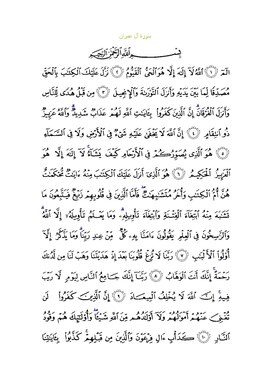Al Imran
| آل عمران Āl Imrān The Family of Imran | |
|---|---|
| Classification | Medinan |
| Position | Juzʼ 3–4 |
| No. of verses | 200 |
| No. of Rukus | 20 |
| No. of words | 3 503 |
| No. of letters | 14 605 |
| Quran |
|---|
Sura Al Imran (Template:Lang-ar, Sūratu Āl 'Imrān,"The Family of Imran")[1] is the 3rd chapter of the Qur'an with two hundred verses.

Overview
Imran in Islam is regarded as the father of Mary. This chapter is named after the family Imran, which includes Imran, Saint Anne, Mary, and Jesus. The chapter is believed to have been revealed in Medina and is either the second or third of the Medinan suras. Almost all of it also belongs to the third year of the Hijra with the possible exception of verse 61, which mentions Mubāhalah and therefore might have been revealed during the visit of the Najrān Christian deputation which was occurred in the 10th year of the Hijrah. This chapter primarily focuses on the departure of prophethood from the Mosaic dispensation. Another speculation[by whom?] is that since the event of Mobahela is the highlight of this surah, Al Imran could very well refer to the progeny of Abu Talib ibn ‘Abd al-Muttalib, whose real name was Imran.
Ayah 7 exegesis
Template:Quote Quran Translation
Verse 7 is notable for several reasons. It states that:
- Some Qur'anic verses are to be understood by others
- Some verses are allegorical
- It includes a disclaimer against misrepresenting the allegorical verses as factual.
- It states that a set of people are to be consulted, those firmly rooted in knowledge.
Shi'a understand those firmly rooted in knowledge to be Muhammad's household (Template:Lang-ar). Sunni understand them to the Muslim jurists (Template:Lang-ar).
هُوَ الَّذِي أَنزَلَ عَلَيْكَ الْكِتَابَ مِنْهُ آيَاتٌ مُّحْكَمَاتٌ هُنَّ أُمُّ الْكِتَابِ وَأُخَرُ مُتَشَابِهَاتٌ فَأَمَّا الَّذِينَ فِي قُلُوبِهِمْ زَيْغٌ فَيَتَّبِعُونَ مَا تَشَابَهَ مِنْهُ ابْتِغَاءَ الْفِتْنَةِ وَابْتِغَاءَ تَأْوِيلِهِ وَمَا يَعْلَمُ تَأْوِيلَهُ إِلاَّ اللّهُ وَالرَّاسِخُونَ فِي الْعِلْمِ يَقُولُونَ آمَنَّا بِهِ كُلٌّ مِّنْ عِندِ رَبِّنَا وَمَا يَذَّكَّرُ إِلاَّ أُوْلُواْ الْأَلْبَابِ
3:7 He is the One Who has since sent to you, the Messenger [Sal'lallaa'hoalaih'wa'salam] the Book. Unitary verbal passages, who have the adjectival specification of "permanently erected fixtures" containing commands and injunctions of firm, established and universal application, are a subset of him/the Book. These are the Mother/Essence/ Main Purpose/Pivot of the Book. In addition, the other subset is such verbal passages that perform the act of mirroring invisible realities and facts through metaphorical presentations. Thereby/making it a pretext, as regards that type of people some atilt/deflection has since made home in whose hearts, thereby they keep pursuing that, which in itself was individually perceived as causing state of confusion, from him/the Book. They do so with the objective of self-distancing from people and self-pursuit of finding the physical manifestation and outcome of him/Book. Allah is the only, none else, Who fully knows the physical elucidation and manifestation and actual outcome of it/the Book; and [contrary to the people of tilted hearts/psyche] as for holders of in depth knowledge-true believers are concerned they keep saying, "We have consciously believed in that, the Book. This is all/entirely is from our Sustainer Lord". [True believers know/have knowledge of conviction that it is a fact from their Sustainer Lord-2:26]
مُّحْكَمَاتٌ is Passive Participle, feminine, plural, nominative; [Form-IV]- -اِحْكَامٌ Verbal Noun.
As against that مُتَشَابِهَاتٌ is Active Participle, feminine, plural, nominative; [Form-VI]- -تَشَابُهٌ Verbal noun.
الْكِتَابَ referring to Qur'an is masculine.The pronouns are also masculine, referring to Book and not to آيَاتٌ which are feminine.
[For detailed study see 01. Surat Fateh "Word by Word Analysis"]
3:169 Take note that you should not consider in respect of those people who get murdered/slain in the way of Allah that they are dead bodies. They are not dead bodies, the fact of the matter is that they are alive. They people are continuously getting sustenance from their Sustainer Lord. [3:169, read with 2:154]
Verses 64-68: Thought provoking to the Christans and the Jews
"Say, "O People of the Scripture, come to a word that is equitable between us and you - that we will not worship except Allah and not associate anything with Him and not take one another as lords instead of Allah." But if they turn away, then say, "Bear witness that we are Muslims [submitting to Him].
O People of the Scripture, why do you argue about Abraham while the Torah and the Gospel were not revealed until after him? Then will you not reason?
Here you are - those who have argued about that of which you have [some] knowledge, but why do you argue about that of which you have no knowledge? And Allah knows, while you know not.
Abraham was neither a Jew nor a Christian, but he was one inclining toward truth, a Muslim [submitting to Allah ]. And he was not of the polytheists.
Indeed, the most worthy of Abraham among the people are those who followed him [in submission to Allah ] and this prophet, and it was also an important surah to every those who believe [in his message]. And Allah is the ally of the believers."
Verse 85: Warning to other religions other than the Islam
"And whoever desires other than submission to ALLAH (Islam) as religion - never will it be accepted from him, and he, in the Hereafter, will be among the losers."[2]
See also
References
External links
- Surah Ali-Imran (Complete text in Arabic with English and French translations)
- Al-Quran browser Āl ʿImrān (The Family of Imran)
- Ali-Imran at Quran.com
- Surah Aal Imran at Thequranrecitation.com with English, Arabic and Urdu Text Recitaion.
- A fragment showing verses 85-88 from the World Digital Library

